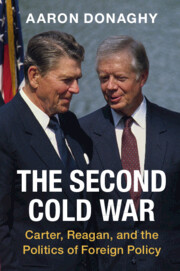Book contents
- The Second Cold War
- Cambridge Studies in US Foreign Relations
- The Second Cold War
- Copyright page
- Dedication
- Contents
- Acknowledgments
- Abbreviations
- Introduction
- 1 The Dwindling of Détente
- 2 “It’s All Political Now”
- 3 To the Right
- 4 Confrontation
- 5 The Nuclear Freeze Movement
- 6 Star Wars and the Evil Empire
- 7 The Most Dangerous Year
- 8 To the Center
- 9 Conciliation
- Epilogue
- Archives
- Notes
- Index
- Cambridge Studies in US Foreign Relations (continued from page ii)
- The Second Cold War
- Cambridge Studies in US Foreign Relations
- The Second Cold War
- Copyright page
- Dedication
- Contents
- Acknowledgments
- Abbreviations
- Introduction
- 1 The Dwindling of Détente
- 2 “It’s All Political Now”
- 3 To the Right
- 4 Confrontation
- 5 The Nuclear Freeze Movement
- 6 Star Wars and the Evil Empire
- 7 The Most Dangerous Year
- 8 To the Center
- 9 Conciliation
- Epilogue
- Archives
- Notes
- Index
- Cambridge Studies in US Foreign Relations (continued from page ii)
Summary
Chapter 3 covers the period from November 1979 through to the end of Carter’s presidency. On December 24, 1979, the Soviet invasion of Afghanistan brought détente to a final, shuddering halt. Together with the US response (the force of which would surprise Moscow), it marked the beginning of a “second” Cold War. It was a conflict that grew more tense, dangerous, and unpredictable over the next four years. Afghanistan followed on the heels of one of the most humiliating episodes in modern US history. The Iran hostage crisis became headline news and struck an emotional chord with the American public. As election season began, Iran and Afghanistan played into the hands of Carter’s critics, who accused him of “weakness.” The world’s number one power, so they argued, could neither stem the tide of Soviet expansion nor bring home the captive Americans. The setbacks allowed political opponents such as Ronald Reagan to declare that the pursuit of SALT had been misguided all along. With criticism mounting, Carter would stake his credibility on a vigorous, alarmist response to the Soviet invasion. It was, he claimed, “the most serious threat to world peace since the Second World War.”
Keywords
- Type
- Chapter
- Information
- The Second Cold WarCarter, Reagan, and the Politics of Foreign Policy, pp. 77 - 113Publisher: Cambridge University PressPrint publication year: 2021

